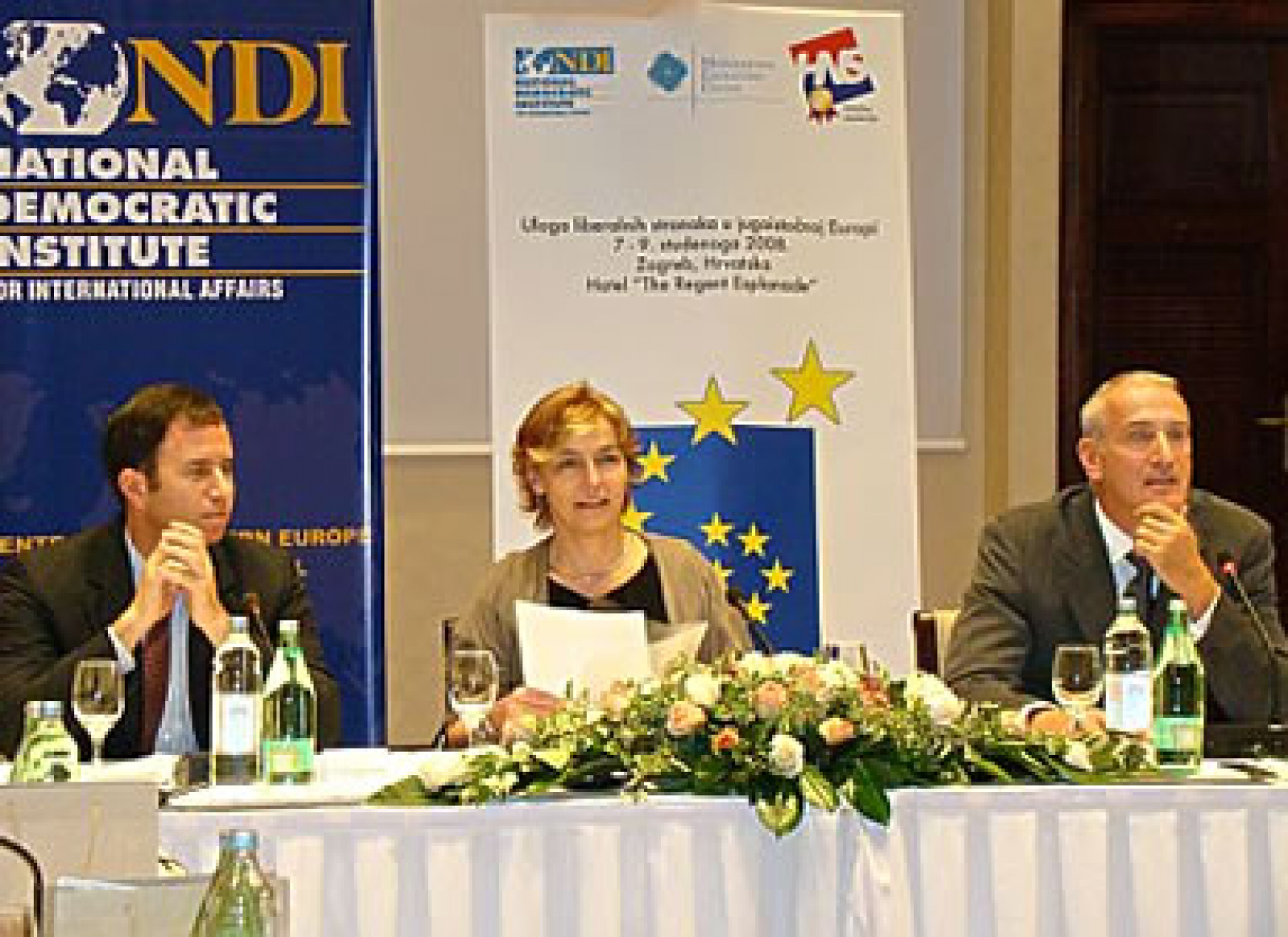
SHARE
With the Croatian People’s Party (HNS) serving as host, NDI brought some 25 representatives of Balkan Liberal political parties to the Croatian capital, Zagreb, for two days of discussion about advocacy of Liberal views on Balkans issues at the European level.
Highlighting the November seminar were policy workshops on ethics reform, gender equality, national security and economic opportunity. Participants also agreed to co-sign a letter calling for Europe-wide visa liberalization for citizens in the Balkans, in keeping with the Liberal emphasis on individual liberty. The seminar built on a new network of Liberal Parties in Southeastern Europe (Libseen). NDI and the HNS were joined by the Friedrich Naumann Stiftung and the Dutch People’s Party for Freedom and Democracy (VVD) as event co-sponsors.
The seminar was part of an NDI initiative to help political parties in Balkan countries readying themselves for membership in the European Union (EU) and broader Euro-Atlantic networks. As they move slowly toward joining the EU as full-fledged democracies, these nations wrestle with the demons of past ethnic wars along with present-day challenges of corruption, unemployment and other ills. Among the many efforts dedicated to readying Balkan governments, civil society and the private sector for the rigors of EU membership and other Euro-Atlantic alliances, few have focused on democratic reforms needed to make the grade. And fewer still have addressed the role that political parties play in providing the vision, leadership and ideas that will deliver the region from its troubled past and move it on toward Europe.
NDI has worked with mainstream parties of the left, center and right in the Balkans for more than 15 years, helping them build their organizations, bring new people into politics, contest elections responsibly and work in parliament on behalf of constituents. This leaves little time to consider bigger questions of how parties espouse and articulate their political identity, devote energy to developing policies responsive to the public interest and provide anxious citizens with clear reform plans to see their countries through uneasy transitions.
That’s why NDI began the regional party initiative, with the goal of helping parties in the Balkans learn from each other and from sister parties around Europe on their roles in contemporary Europe. The Institute grouped its partners in Social Democratic, Liberal and Conservative groups, respectively. The initiative is funded by the National Endowment for Democracy and has active support from a variety of European party foundations.
Liberal parties in the Balkans have an especially important role in championing individual freedoms in a region exiting home-grown communism. Liberal parties have served in government, particularly in such countries as Bulgaria, Croatia and Romania that have seen quicker European integration, more robust economic growth and faster development of a middle class as compared to their neighbors.
The parties gathered in Zagreb – from Bosnia-Herzegovina, Croatia, Kosovo, Macedonia, Montenegro and Serbia – were joined by counterparts from Bulgaria, Greece, Germany, the Netherlands, Romania, Slovenia and the United Kingdom, as well as Liberal International. LI Secretary General Emil Kirjas affirmed the importance of cooperation among Liberals in the region as well throughout Europe.
The vice president of the European Liberal Democrat and Reform (ELDR) party and LIBSEEN chair, Vesna Pusic, underscored this point in a keynote address. The ethnic wars of the 1990s that destroyed Yugoslavia were a betrayal of the values that its peoples share, she said, noting that peace and stability will ensue from functioning democratic institutions and civil society that span the sovereign borders that now mark the former Yugoslavia. Democracy cannot be imposed, she added, but rather will grow through the cultivation of home-grown political leaders with common understanding of shared values and issues. In this context Liberal ideas should be pursued throughout the region, she said.
Participants discussed how to form coalitions with parties to the left and right without sacrificing Liberal values, how to enhance national security without damaging individual rights, and whether gender quotas and other policies designed to promote those traditionally excluded from leadership detract from Liberal tenets on individual merit. There was also an interesting discourse on policy formation, led by Christian Moon, deputy head of U.K. LibDem policy and research center, in which he offered that party policies arising from consultation of rank and file often produce positions that don’t mesh with the inevitable compromises that occur within coalition governments seeking broad public support. What emerged through the discussions was a heightened recognition of challenges and opportunities among those who are charged with advocating Liberal ideas and values in the Balkans.
In the seminar’s wake, NDI country teams will put the discussions to good use in supporting the Institute’s Liberal partners in-country. With NDI support, HNS officials visited Kosovo in December to share their experiences in setting up party structures with New Kosovo Alliance (AKR), a new Liberal party. As well, Dutch VVD representatives were in Kosovo recently to assist the Autonomous Liberal Party (SLS), which represents Kosovar Serb communities.
Pictured above: Robert Benjamin (left), NDI director for Central and Eastern Europe, with Vesna Pusic (center), vice president of the European Liberal Democrat and Reform Party and chair of the Liberal Southeastern Network (LIBSEEN), and Boris Blazekovic, director of the Croatian People’s Party’s Political Academy, at a November conference in Zagreb, Croatia.
–
Published on Dec. 23, 2008


